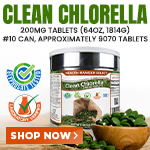
Learn Why You May Need More Vitamin B12
Friday, December 04, 2009 by: Elizabeth Walling
Tags: vitamin B12, health news, Natural News
- Gardening tips: 15 Simple tricks to double your garden’s yield this season
- TAKE IT DOWN Act advances in Congress amid free speech concerns
- Survival 101: Dangerous places to avoid when disaster strikes
- Nature’s arsenal: How plant compounds power military survival and healthcare in crisis
- Kawasaki unveils rideable ROBOT HORSE powered by hydrogen
- Amazon's Kuiper satellite launch delay highlights uphill battle against Musk's Starlink
- DOJ and ATF kill Biden’s “Zero Tolerance” firearms dealer policy
- Criminal referral requests filed against Fauci and top COVID officials in seven states
- “Prepare Tribe: Prepare, Protect, Provide” on BrightU: How to build a disaster-proof shelter in the middle of nowhere
- Barley: A nutrient-dense ancient grain with modern benefits
- Hospital staffers sound alarm after 10 nurses were diagnosed with BRAIN TUMORS
- Germany prepares students for war amid growing security concerns
- Rafael Medoff explores the role of Jabotinsky in the rise of Revisionist Zionism in “Militant Zionism in America”
- New studies ignite debate: Fluoride linked to autism and ADHD, prompting calls for policy reassessment
- Yoga and autism: A science-backed look at how a simple practice is transforming behavior and movement in children with ASD
- POLL: U.S. support for Israel drops to lowest level in decades amid Gaza War
- Trump escalates tariffs to 145% on Chinese goods amid fentanyl crisis, escalating trade tensions
- Study reveals social media’s stealthy role in the childhood OBESITY crisis
- Tulsi Gabbard leads charge against the Biden regime’s global censorship of the 'Disinformation Dozen'
- Fauci is back in the limelight, and he’s busy promoting a future COVID or FLU pandemic
- Aerosolized bioweapons? Strange “diploid biomasses” falling out of the sky in Florida captured under the microscope
- Analysis: The coming economic collapse, a mass uprising and Trump's three secret weapons to halt the growing revolt
- Widespread social and economic unrest: Steve Quayle issues urgent financial warning of imminent asset collapse in new interview with Mike Adams
- Kiss Your Genetic Privacy Good-Bye! 23andMe Gets Green Light to Sell Your Intimate Genetic Details to Anyone They Want
- Tulsi Gabbard takes aim at censorship: Justice for the ‘Disinformation Dozen’
- Mike Adams releases country western hit single: Goin’ Back in Time is Comin’ Home
- U.S. lawmakers investigate Meta over alleged China collaboration
- CLOT SHOT PLANDEMIC UNFOLDING: Fibrous, rubbery clots caused by covid injections have prion-like seeding activity
- Chemtrails unveiled: How the CIA and Big Business are manipulating the weather for profit
- How Israeli military-connected corporations are secretly controlling your online privacy
- European Court of Justice: Healthcare professionals who promoted or administered COVID-19 vaccines are CRIMINALLY LIABLE for any harm caused
- DEATH by VACCINE or face PRISON time: Canadian Freedom Convoy leaders CONVICTED for protesting forced vaccination during the Covid Plandemic
- Defunding DEADLY mRNA jabs: Government funding for mRNA technology being scrutinized and sidelined until proven "safe and effective" for real
- Federal employees whine over DOGE's new directive requiring them to do a 5-point summary of weekly accomplishments
- U.S. approves new Russian ambassador as diplomatic thaw continues
- Curcumin’s ancient healing power supercharges muscle recovery, and its effects are compounded with anti-inflammatory foods and supplements
- Newly released JFK files reveal Pentagon's role in creating Lyme disease and covid in the same lab
- Analysis: The coming economic collapse, a mass uprising and Trump's three secret weapons to halt the growing revolt
- Mike Adams releases country western hit single: Goin’ Back in Time is Comin’ Home
- Aerosolized bioweapons? Strange “diploid biomasses” falling out of the sky in Florida captured under the microscope
- Kiss Your Genetic Privacy Good-Bye! 23andMe Gets Green Light to Sell Your Intimate Genetic Details to Anyone They Want
- Dr. Mike Yeadon releases 15-minute testimony - WATCH - about genocidal intent of COVID “vaccines”
- Trump reverses course on Gaza plan, says “nobody is expelling Palestinians”
- MEDICAL BOMBSHELL: FDA admits Covid mRNA 'Vaccines' CAUSE CANCER
- European Court of Justice: Healthcare professionals who promoted or administered COVID-19 vaccines are CRIMINALLY LIABLE for any harm caused
- The Health Ranger releases “Vaccine Zombie” song and music video, using AI-animated zombies for the music video
- 5 Simple steps to boost your brainpower: How to strengthen executive function in a distracted world
- A lack of integrity in Academia: Harvard professor found GUILTY of fraudulent research to promote CRT theory
- Federal employees whine over DOGE's new directive requiring them to do a 5-point summary of weekly accomplishments
- EPA advisor admits the agency is funneling billions to climate groups ahead of Trump’s return to White House
- California's social media censorship law struck down: A victory for free speech or a threat to online safety?
- Space war brewing? Russia threatens to destroy Starlink satellites
- Survival 101: Effective EMF blocking techniques
- Rep. Nancy Mace introduces bill to ban biological males from female facilities on federal property
- Red Cross issues warning to stop blood plasma donations from vaccinated people
- Scientists confirm: GENIUS brain function can be spontaneously unleashed in humans without any apparent cause
- EPA advisor admits the agency is funneling billions to climate groups ahead of Trump’s return to White House
- HYSSOP: What research reveals about the health benefits of this ancient holy herb
- Two containers with completed ballots fall out of truck in Florida
- Newly released JFK files reveal Pentagon's role in creating Lyme disease and covid in the same lab
- Global leaders unite to clamp down on “misinformation” with UN-backed Cascais Declaration
- BREAKING: 2025 NDAA authorizes mandatory military draft of WOMEN across America… as Pentagon pursues global NUCLEAR war with both Russia and China at the same time
- Michael Yon warns of a ZIONIST TAKEOVER in Trump’s second administration
- Ozempic and Wegovy weight loss drugs are injectable LIZARD VENOM PEPTIDES that may unleash a devastating wave of organ failure… side effects align with symptoms of SNAKE BITES
- The Health Ranger releases “Vaccine Zombie” song and music video, using AI-animated zombies for the music video
- Mike Adams releases country western hit single: Goin’ Back in Time is Comin’ Home
- BOMBSHELL: DNA testing kits are a SCAM to develop ethnic-specific bioweapons
- Israeli soldiers accused of even more torture and abuse in the West Bank
- These 13 countries just signed an agreement to engineer a global FAMINE by destroying food supply
- NASA admits that climate change occurs because of changes in Earth’s solar orbit, and NOT because of SUVs and fossil fuels
- Fully vaccinated about to see “tsunami” of illness and death, warns virologist
- RFK Jr. clears key hurdle: Sen. Susan Collins backs controversial HHS nominee, signaling a new era for health policy
- fatigue
- lightheadedness
- insomnia
- memory loss
- difficulty concentrating
- pins-and-needles feeling in fingers and toes
- depression
- obsessive-compulsive behavior
- irrational anger
- alcoholism
- dementia
- constipation
- impotence
A B12 deficiency can occur gradually over a period of years. The number and severity of side effects builds as time passes and the deficiency worsens. Preventing and treating a vitamin B12 deficiency naturally as soon as possible is crucial for well-being and general health.
A deficiency in B12 is increasingly common because many people are either not getting enough bioavailable B12 in their diet, or their bodies have trouble absorbing and utilizing B12. Let's explore the former issue first:
Not all vitamin B12 in food is bioavailable. For instance, the B12 in plant foods (like green vegetables and soy) is an analog form of the vitamin which cannot be used in the human body. This analog B12 can actually interfere with the absorption of other types of vitamin B12, making the reliance on plant foods for B12 very ineffective for many individuals. Soy foods, in particular, appear to cause problems in B12 absorption.
The best natural sources of bioavailable vitamin B12 are from wild-caught fish, shellfish, humanely-raised meats, pastured eggs, and milk that is raw and unpasteurized, since pasteurization produces proteins that block B12 absorption. Of course, high quality foods raised with natural practices will provide the widest spectrum of bioavailable nutrients, including B12.
If you can't include these natural sources of vitamin B12 in your diet, then supplementation can be highly beneficial and even necessary.
Of course, there are many people who do consume plenty of natural vitamin B12, but have trouble absorbing it properly. This can be caused by several factors:
- Candida overgrowth, celiac disease, Crohn's disease and internal parasites can disrupt the bacteria in the gut which promote B12 absorption.
- If you've had part of your stomach or small intestine removed during surgery, this can interfere with B12 absorption.
- Antacids and other heartburn medications reduce stomach acid (which is required for the body to utilize B12).
Vitamin B12 Supplementation
There are two common methods of vitamin B12 supplementation: with shots (administered weekly or monthly at a doctor's office or at home), or with pills. Both methods appear to be effective for treating a B12 deficiency.
Methylcobalamin is the form of choice when it comes to B12. Though cyanocobalamin is the most common form (it's the most common type seem in multivitamins and B-complex formulas), it is far less effective. Sublingual tablets are preferred because they enhance absorption.
The dosage of B12 supplementation varies depending on how deficient you are, but a typical daily sublingual dose is 100 - 250 mcg. Those who have trouble absorbing B12 will need much higher doses, such as 1,000 - 2,000 mcg daily.
For More Information:
http://www.westonaprice.org/basicnutrition/v...
http://www.westonaprice.org/mythstruths/mtve...
http://www.webmd.com/a-to-z-guides/vitamin-b...
About the author
Elizabeth Walling is a freelance writer specializing in health and family nutrition. She is a strong believer in natural living as a way to improve health and prevent modern disease. She enjoys thinking outside of the box and challenging common myths about health and wellness. You can visit her blog to learn more:www.livingthenourishedlife.com/2009/10/welco...
Vitamin B12 at FETCH.news
Get independent news alerts on natural cures, food lab tests, cannabis medicine, science, robotics, drones, privacy and more.
Take Action: Support Natural News by linking to this article from your website
Permalink to this article:
Embed article link: (copy HTML code below):
Reprinting this article:
Non-commercial use OK, cite NaturalNews.com with clickable link.
Follow Natural News on Facebook, Twitter, Google Plus, and Pinterest
Science News & Studies
Medicine News and Information
Food News & Studies
Health News & Studies
Herbs News & Information
Pollution News & Studies
Cancer News & Studies
Climate News & Studies
Survival News & Information
Gear News & Information
News covering technology, stocks, hackers, and more



"Big Tech and mainstream media are constantly trying to silence the independent voices that dare to bring you the truth about toxic food ingredients, dangerous medications and the failed, fraudulent science of the profit-driven medical establishment.
Email is one of the best ways to make sure you stay informed, without the censorship of the tech giants (Google, Apple, Facebook, Twitter, YouTube, etc.). Stay informed and you'll even likely learn information that may help save your own life."
–The Health Ranger, Mike Adams












































